Japan wants to host the FIFA Women’s World Cup in 2031 to ignite the domestic game and cut the gap on Europe and North America, the country’s soccer chief told reporters on Monday.
In 2011 Japan won the competition, but they have since been overtaken, with women’s soccer booming in Europe in the past few years.
“We would like to raise the value of women’s football here,” Japan Football Association president Tsuneyasu Miyamoto said in an interview at the association’s headquarters in Tokyo, in front of a giant photograph of Japan’s World Cup-winning team.
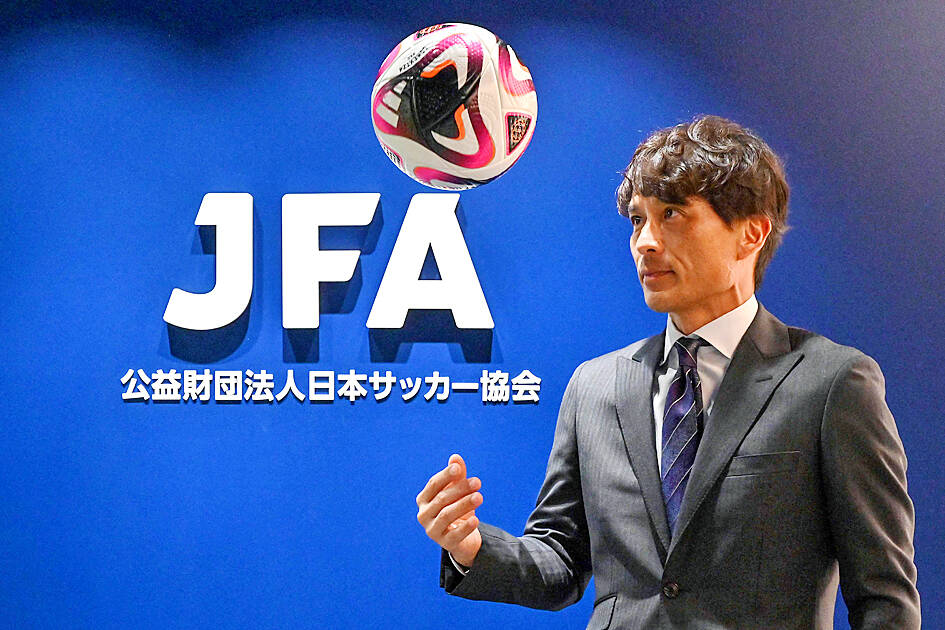
Photo: AFP
Miyamoto was captain of the Japan men’s team when they cohosted the World Cup with South Korea in 2002, a tournament that helped spark huge interest in soccer among the Japanese public.
Now 47, he took over as head of the association this year and has similar hopes for the 2031 Women’s World Cup. The country has never hosted the event.
However, Japan is likely to face stiff competition for hosting rights, with a joint bid from the US and Mexico expected. England and China are also reportedly interested.
“We have the WE League, and it has been struggling to gather an audience,” Miyamoto said. “We would like to increase the number of women players here.”
The professional women’s WE League launched in 2021, but it has failed to attract anything like the attendances and revenue enjoyed by women’s leagues in Europe and the US.
Japan’s women have not gone beyond the quarter-finals at a world cup since they lost to the US in the 2015 final.
Miyamoto said that Japan “could have done better” to capitalize on the 2011 triumph, which triggered massive interest in women’s soccer before it quickly fizzled out.
The former defender wants Japan to develop a more passionate soccer culture, saying that his stint with Austrian side Red Bull Salzburg “inspired me a lot.”
“They have their own culture, they have football in their daily lives,” he said.
“We haven’t built that kind of community here in Japan. I’d like to make football our culture in Japan,” he added.
Miyamoto played 71 times for his country, captaining the side at the 2002 and 2006 world cups.
He spent most of his career in the domestic J. League, at a time when only a few Japan internationals played for European clubs.
Japanese players are now all over Europe and the national team has benefitted as a result, regularly appearing in the World Cup knockout rounds.
“It’s very normal for them to play in the Champions League,” Miyamoto said of the current generation of players. “When facing big teams like Germany or Spain ... they have no fear.”
The steady stream of players to Europe has helped Japan’s national team, but also posed problems for J. League clubs.
Miyamoto said that they need to keep producing talent, but argues that “transfer fees for Japanese players are low compared to players from South America.”
Brighton & Hove Albion paid just £2.5 million (US$3.24 million) to sign winger Kaoru Mitoma in 2021, while prolific scorer Kyogo Furuhashi joined Celtic for £4.5 million the same year.
“In Europe clubs are very strong, but in Japan clubs are not that strong,” Miyamoto said. “Players who only have six months left on their contract are still playing in official matches. After the season, they will be free to go anywhere, and in that case, clubs can’t get any money.”
Miyamoto wants to bring a new way of thinking to Japanese soccer.
He is a graduate of the FIFA Master sports executive program and also had a stint coaching J. League side Gamba Osaka.
He is the first Japan Football Association president to have played at a World Cup and the youngest since the end of World War II.
“Former players, especially players who played at a high level, know how the football world works,” Miyamoto said. “Forty-seven is not young as a person. Talking about leaders of national organizations, maybe 47 is young. Maybe a new generation might be able to bring something new into this world.”
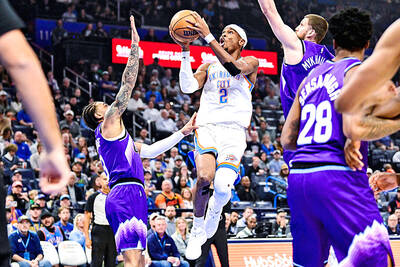
MOTHER KNOWS BEST: Warriors’ coach Kerr said his 91-year-old mother criticized him for his attitude toward officials that led to his ejection from Monday’s game Shai Gilgeous-Alexander on Wednesday rescued the Oklahoma City Thunder with a game-tying buzzer-beater before finishing with 46 points in a 129-125 overtime victory against the Utah Jazz. The reigning NBA champions looked to be heading for a third straight loss after the Jazz inched into a 114-112 lead following Lauri Markkanen’s layup with just three seconds remaining in the fourth quarter. However, NBA Most Valuable Player Gilgeous-Alexander drained a superb 13-foot jump shot to tie it up at 114-114 as the buzzer sounded to send the game into overtime. Gilgeous-Alexander then took over in the extra period with nine points as the Western
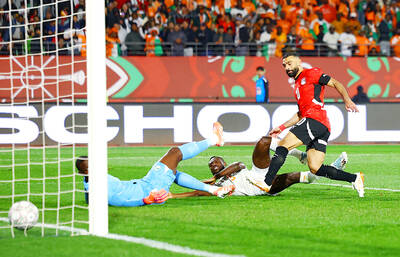
Mohamed Salah’s Egypt knocked reigning champions Ivory Coast out of the Africa Cup of Nations (AFCON) with a 3-2 win in the quarter-finals on Saturday, while Victor Osimhen starred as Nigeria beat Algeria 2-0 to set up a clash with hosts Morocco. In Agadir, Morocco, a thrilling last-eight tie saw Omar Marmoush and Ramy Rabia net in the first half for the Pharaohs before an own goal by Ahmed Aboul-Fetouh brought the Ivorians back into it. Salah then got Egypt’s third early in the second half and they held on after Guela Doue again reduced the deficit. Egypt is to face Senegal
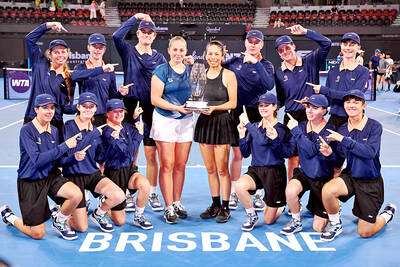
AUSTRALIAN ADVENTURE: Sabalenka aims to follow up with a third Australian Open win, while Taiwanese Joanna Garland claimed a WTA 125 title in Canberra Aryna Sabalenka beat Karolina Muchova in straight sets to reach her third Brisbane International final in a row yesterday, a week ahead of the Australian Open. Sabalenka looked in great touch against the tricky Czech, who had won their last three meetings and went into the match as one of the few players with a winning record over the world No. 1. However, Sabalenka showed her class and power as she broke Muchova once in each set to take the semi-final 6-3, 6-4 in 89 minutes to face Ukraine’s Marta Kostyuk in the final. “I struggled against her a couple of times [in
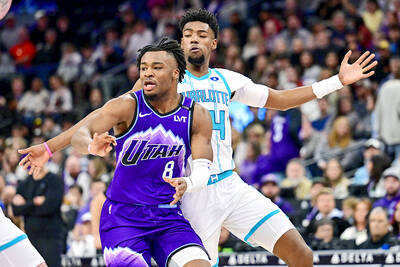
Brandon Miller scored 18 points, LaMelo Ball had 17 and the Charlotte Hornets built a 47-point lead in the first half of a 150-95 rout against the Utah Jazz on Saturday night. It was the second-biggest win in franchise history for the Hornets and their largest on the road. The Hornets bounced back from a pair of frustrating losses in a big way, having fallen to Toronto by one point and Indiana by two in their last two games. Charlotte pounded the NBA champion Thunder by 27 in Oklahoma City before those defeats, previously the Hornets’ most lopsided victory of the season. Tre